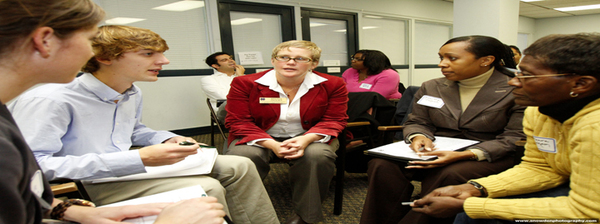
By Allison Nanni
Angela Brister, a local Michiana entrepreneur, decided to participate in the October 1 business planning workshop at the Sample Street Business Complex because her pastor, Tina Patton, suggested it.
“I thought the experience might help me sort through some of the ideas swimming around in my head,” says Brister.
While living in Illinois, Brister ran a successful website design company for seven years. One of her ideas is to create a similar company here to service small business owners. However a dream of opening a hair-braiding salon has been percolating as well. “The research on other companies will be invaluable for me as I make the decision about which direction to take,” Brister says.
The business-planning workshop Brister attended was offered through a partnership between the Gigot Center for Entrepreneurial Studies of the Mendoza College of Business at the University of Notre Dame (The Gigot Center), The Michiana African American Chamber of Commerce (MAACC), the Economic Development Committee of 100 Black Men and the Notre Dame Legal Aid Clinic.
As a newcomer to Michiana, Brister felt the individual attention she received from the students and partners was what set this experience apart from other technical workshops she has attended in the past. “The students helped me to work more research and details into my business plan,” Brister says.
Jackie Rucker, associate director of community relations, says of the local partners, “The MAACC and the Economic Development Committee of 100 Black Men are committed to trying to build capacity in the minority community. Glenn Williams of the MAACC marketed the educational opportunity to the organization’s membership and among his professional networks. Williams also provided the space at the west-side facility used for the training. James Summers of 100 Black Men helped us to develop the focus for the day. Their input was critical to the success of the program.”

For the Gigot Center, this was a great example of a community partnership that complemented one of the center’s core strengths – and linked the community to market the delivery of a high-quality entrepreneurial program. “When students alone market this type of workshop opportunities, we typically draw 12-15 people,” explains Melissa Paulsen, Program Manager and Concurrent Instructor at the Gigot Center. With the Michiana African American Chamber of Commerce, One Hundred Black Men and Notre Dame’s Office of Community Relations as strong marketing partners, over thirty enthusiastic, local micro-entrepreneurs participated in the half-day workshop. “Micro-entrepreneurs trust these local organizations. The grass roots organizations vouch for our credibility and for the expertise and individual attention participants can expect from these sessions,” says Paulsen.
Both graduate and undergraduate members of Notre Dame’s student groups, Net Impact and the Student International Business Council, collaborated with Paulsen to implement two hands-on sessions. Dag Brummet, a recent Notre Dame MBA graduate, also assisted Paulsen with the content for the workshop.
The first morning session focused on Ideation. Faculty advisors, MBA and undergraduate students consulted with the entrepreneurs individually. Together they completed a questionnaire comprised of difficult questions around business strategy: What makes your good idea a viable market opportunity? What components should you have in place before beginning? Which components might be missing?

The second session, entitled Marketing and the Competitive Advantage, stretched small business owner Marvin Crayton. Crayton founded his business, Marvin A. Crayton Construction Co., Inc. in 1984.“The workshop refreshed me and reinforced some ideas I had about updating my business plan. In this economy, finding general and commercial construction contracts is tough. I am looking for that competitive edge,” says Crayton.
Paulsen adds that the event was mutually beneficial for both the Notre Dame students and the micro-entrepreneurs. “The workshop is a great experiential learning tool for the students. Abstract ideas become concrete when the students tackle the strategic issues of beginning a small business together with the workshop participants.” Conversely, micro-entrepreneurs learn about concepts such as value proposition and competitive advantage before launching their own businesses.
The Gigot Center works in conjunction with the Small Business Development Center (SBDC) to avoid any duplication of educational programming, and to bridge the micro-entrepreneur to the technical assistance the SBDC offers.
After this introductory workshop, many entrepreneurs now feel ready to pursue their business idea as well as additional knowledge from community resources including SBDC to build their business.
“We need strong businesses on the west side,” says Crayton, “I would point other local entrepreneurs to what Notre Dame has to offer.”